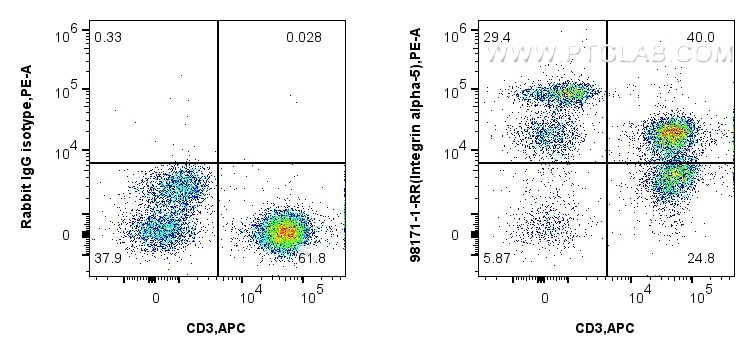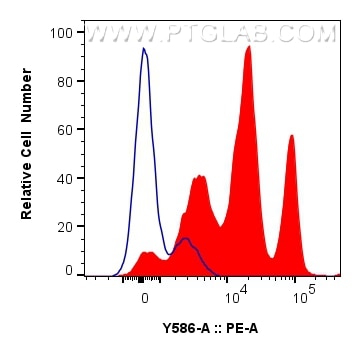Tested Applications
| Positive FC detected in | human PBMCs |
Recommended dilution
| Application | Dilution |
|---|---|
| Flow Cytometry (FC) | FC : 0.25 ug per 10^6 cells in 100 μl suspension |
| This reagent has been tested for flow cytometric analysis. It is recommended that this reagent should be titrated in each testing system to obtain optimal results. | |
| Sample-dependent, Check data in validation data gallery. | |
Product Information
98171-1-RR targets Integrin alpha-5/CD49e in FC applications and shows reactivity with human samples.
| Tested Reactivity | human |
| Host / Isotype | Rabbit / IgG |
| Class | Recombinant |
| Type | Antibody |
| Immunogen | Recombinant Protein Predict reactive species |
| Full Name | integrin, alpha 5 (fibronectin receptor, alpha polypeptide) |
| Calculated Molecular Weight | 115 kDa |
| GenBank Accession Number | BC008786 |
| Gene Symbol | Integrin alpha 5 |
| Gene ID (NCBI) | 3678 |
| RRID | AB_3672314 |
| Conjugate | Unconjugated |
| Form | Liquid |
| Purification Method | Protein A purfication |
| UNIPROT ID | P08648 |
| Storage Buffer | PBS with 0.09% sodium azide, pH 7.3. |
| Storage Conditions | Store at 2 - 8°C. Stable for one year after shipment. |
Background Information
Integrins are cell adhesion receptors that are heterodimers composed of non-covalently associated alpha and beta subunits. Integrin alpha-5 (ITGA5, also known as CD49e), belongs to the integrin alpha chain family, primarily binds to Integrin beta 1 (ITGB1) to form an α5β1 heterodimer (PMID: 33711961). Integrin α5β1 is a specific receptor of fibronectin through its arginine-glycine-aspartic acid (RGD) binding site (PMID: 19608542). Integrin α5β1 plays roles in cell adhesion, migration and matrix formation, and has emerged as an essential mediator in many human carcinomas (PMID: 33408483).
Protocols
| Product Specific Protocols | |
|---|---|
| FC protocol for Integrin alpha-5/CD49e antibody 98171-1-RR | Download protocol |
| Standard Protocols | |
|---|---|
| Click here to view our Standard Protocols |





